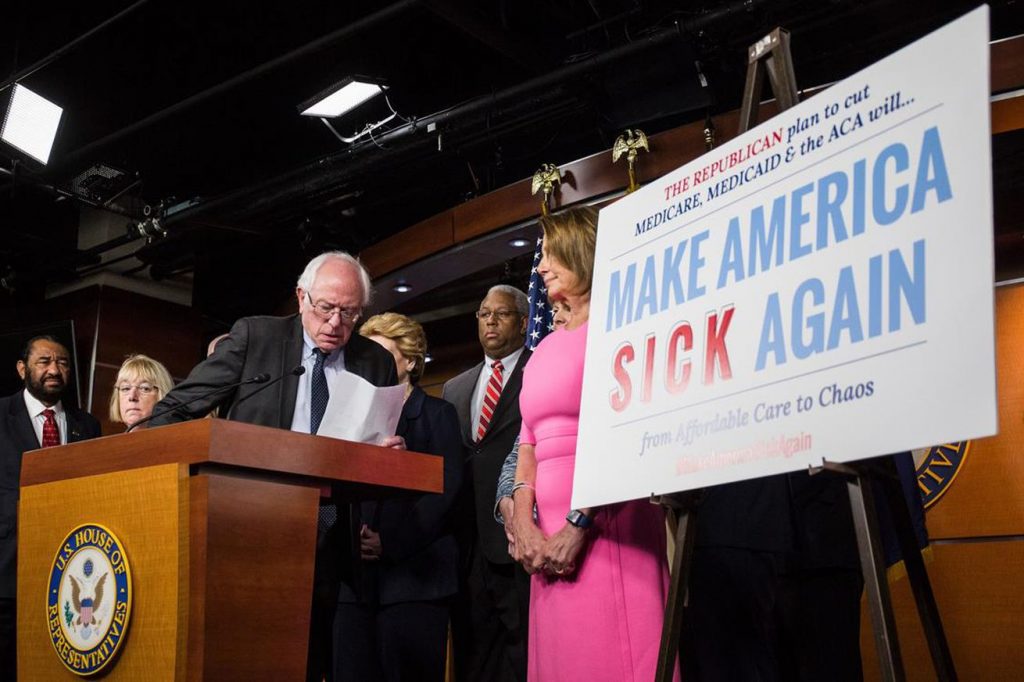get VoxCare in your inbox here .
Buckle up for an incredibly busy week in health care — both in the Senate and across the states.
Senate Republicans are still reportedly charging toward a vote before the July 4 recess. This leaves 10 working days to actually draft that bill, get a Congressional Budget Office score, and hold the vote itself.
We already have a sense of the broad contours of the Senate bill. It will roll back the Affordable Care Act’s taxes on wealthier Americans, thereby cutting off funding for the health law’s coverage expansion. But the questions that still loom large over the bill — how long senators will wait to sunset the Medicaid expansion, for example, and how they will structure the premium tax credits — are still ones that need to get sorted out over the coming weeks.
Senate Democrats are stepping up their campaign to save the Affordable Care Act. They are planning to hold up regular business in the chamber starting this evening. My co-author here at VoxCare, Dylan Scott, has the details :
Starting Monday night, Senate Democrats will start objecting to most unanimous consent requests, according to a senior Democratic aide.
Those requests are routine in the Senate and allow committee hearings to go forward and uncontroversial bills and nominations to be expedited to the floor. (Exceptions could be made for some honorary resolutions, the aide said, like those honoring the victims of last week’s congressional shooting.)
The aide wouldn’t say how long Democrats would keep up their protest, though it is expected to continue beyond Monday if Republicans did not immediately relent.
This tactic isn’t going to hold up Senate repeal efforts forever, but it is going to attempt to draw more attention to the Republican repeal efforts that have so far proceeded largely behind closed doors.
Meanwhile: Health plans need to announce by Wednesday whether they intend to stick with the Obamacare marketplaces — or call it quits. June 21 is the deadline for insurance plans to announce where they plan to sell Affordable Care Act coverage in 2018. This is a critical deadline because, as things currently stand, we know of 47 counties at risk of having no insurers participate in 2018.
We’ll be watching to see whether that number goes up or if we see any new health insurance plans coming into the market. This is not the final deadline; some enterprising insurance plans might see empty areas of the country and raise their hand to fill the gap. But it will be our first look at how big those gaps are and what challenges lie ahead for the Affordable Care Act’s teetering marketplaces.
R.I.P. Sprinklecare Nevada Gov. Brian Sandoval vetoed the state’s Medicaid buy-in bill — known as Sprinklecare, because it was sponsored by Nevada State Assembly member Mike Sprinkle — late Friday. In a three-page veto message , Sandoval lauded the legislators for their “creativity” but also criticized the bill as “adding more uncertainty to an industry that needs less.”
“Moving too soon without factual foundation or adequate understanding of the possible consequences could introduce more uncertainty to an already fragile healthcare market, and ultimately affect patient care,” Sandoval wrote.
I’d place my wager that this isn’t the end of the Medicaid buy-in movement. Now that Nevada put it on the national map as a policy idea, I’d expect to see other states experimenting with similar proposals over the next few years.
Chart of the Day Alvin Chang/Vox Which Democrats are talking the most on Twitter about health care, charted . It turns out that Senate Democrats tweeted about health care twice as frequently as they have about Russia scandals over the course of the past week, according to a new analysis of Senate Democrats’ Twitter feeds, provided to Vox by the Progressive Coders Network’s Matthew Borg. Read more from my colleagues Jeff Stein and Alvin Chang.
Kliff’s Notes Your daily top health care reads, with research help from Caitlin Davis
Today’s top news
“RSC warns Senate: Healthcare changes may ‘jeopardize’ bill” : “The Republican Study Committee (RSC) is sending up a warning flare to Senate Republicans over changes to the ObamaCare repeal-and-replace bill, warning that the alterations ‘may jeopardize final passage in the House.’ The RSC, which the largest bloc of conservatives in Congress, has drafted a letter to Senate Majority Leader Mitch McConnell (R-Ky.) raising ‘serious concerns’ with the direction of the Senate’s healthcare legislation.” —Rachel Roubein, the Hill “Democrats use Trump ‘mean’ comment to tar GOP” : “Democrats are seeking to capitalize on President Donald Trump calling the Republican health care bill ‘mean’ ahead of the Senate’s vote to repeal Obamacare, seeing it as a pivotal moment in an issue that could drive the 2018 midterm elections.” —Josh Dawsey and Seung Min Kim, Politico “Sanders Signals Backing of Senate Slowdown Over Health-Care Bill” : “Senator Bernie Sanders signaled support for Democrats trying to shut down Senate business in response to Republicans’ closed-door work on legislation to replace Obamacare. ‘I am in favor of the American people and members of Congress doing everything that we can to defeat that horrific piece of legislation that will hurt tens and tens of millions of people in our country,’ Sanders said.” —David McLaughlin, Bloomberg
Analysis and longer reads
“Mitch McConnell on the health-care legislative process, 2010 vs. 2017” : “Reconciliation is an unusual tactic — generally reserved for budget and tax policy — that gets around Senate rules designed to force a supermajority on bills. McConnell was against it when Democrats used it but has now embraced it from the start.” —Glenn Kessler, Washington Post “Obamacare in Alaska: Cost-Control Plan Is Challenging but Working” : “Alaska not only had a unique need for the program thanks to its outlandishly high premiums, but it also had the budget reserves to fund it without making any cuts or adding any taxes. It should have been easy — or at least easier here than anywhere else. But interviews with dozens of state lawmakers and industry officials show that the path was anything but.” —Erin Mershon, Roll Call “Why the GOP is struggling to repeal Obamacare” : “For the past seven years, the electoral incentives of most Republicans reinforced a strong commitment to repealing Obamacare. The law remained unpopular, the GOP’s core supporters were determined to repeal it, and the party lacked the numbers to do so. But present divisions in the party suggests that some Republicans have reinterpreted the electoral incentives surrounding Obamacare after last year’s election.” —James Wallner, Washington Examiner
[“Source-ndtv”]

 This is the web version of VoxCare, a daily newsletter from Vox on the latest twists and turns in America’s health care debate. Like what you’re reading? Sign up to get VoxCare in your inbox here.
This is the web version of VoxCare, a daily newsletter from Vox on the latest twists and turns in America’s health care debate. Like what you’re reading? Sign up to get VoxCare in your inbox here.



